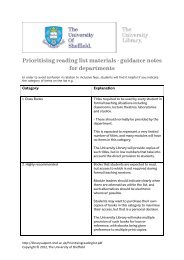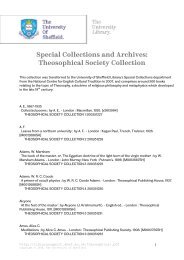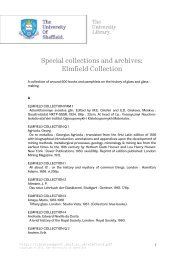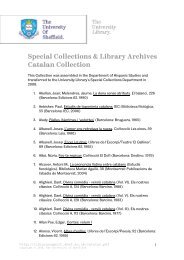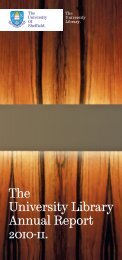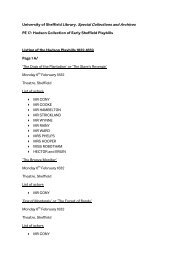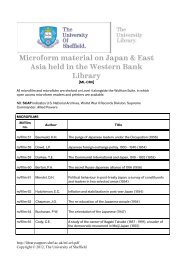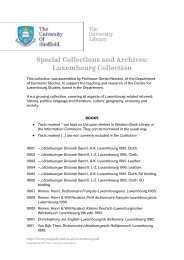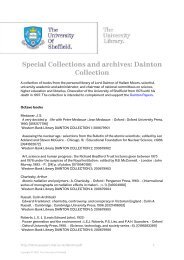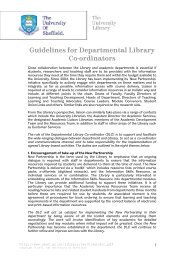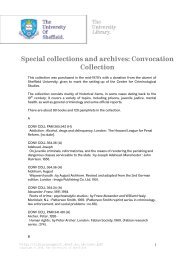The Geoffrey Bullough Collection - Temporary Home Page ...
The Geoffrey Bullough Collection - Temporary Home Page ...
The Geoffrey Bullough Collection - Temporary Home Page ...
Create successful ePaper yourself
Turn your PDF publications into a flip-book with our unique Google optimized e-Paper software.
pages 103 ff.), nor do some of the very peripheral lower class characters<br />
onboard ship (e.g. ship‘s carpenter)<br />
Old Dutch gentleman turns out to speak ‗good English‘ with only the<br />
occasional ‗Mein gott‘ to mark him as Dutch (p. 166)<br />
American captain has no real marking of an American dialect: ―And I referred<br />
to the spar, which is my business, and not to the vessel, which is no consarn of<br />
mine,‖ replied the American captain. [p. 270] (only consarn seems to mark<br />
accent)<br />
French soldiers do not have much of a French accent, except a passing ‗Allons‘<br />
(p. 395).<br />
<strong>Bullough</strong> <strong>Collection</strong> No. 326 Gideon Giles: <strong>The</strong> Roper by Thomas Miller<br />
1. Publication details<br />
Author: Thomas Miller<br />
Author dates:<br />
Title: Gideon Giles: <strong>The</strong> Roper<br />
Publication: London: Henry Lea, 1860?<br />
First published:<br />
Library reference: 200350787<br />
2. Genre / subgenre<br />
Literary fiction<br />
3. Brief Synopsis<br />
Tales of rural life, villages, and the larger-than-life characters therein, loosely<br />
gathered around central character, Gideon Giles. Many anecdotes and amusing<br />
sketches.<br />
4. Overview of varieties / dialects<br />
Incidental characters have marked dialect, but very little dialogue. For example,<br />
―You‘ll find him at th‘ yeal-house, zur,‖ answered the peasant; ―he allos goes there<br />
when he‘s pinned aught.‖ from an un-named ‗peasant‘ who does not re-appear in the<br />
narrative. For characters who are more central, fewer dialect markers are used, and<br />
these are often glossed in parentheses.<br />
5. Variety #1: Cousin William, waiter/footman. Note – claims to be his written note.<br />
5a. Sample of dialect<br />
―Item. If yuve a lump of fat, or ought on yure plate yo don‘t like, don‘t go and slap it on<br />
somebody else‘s plate, and say, ‗I can‘t eat fat,‘ cos it looks like as if you‘d had no<br />
broughting up. Best way is, to slip it on, on the sly, when they aint (are not) looking;<br />
same if yo want to take aught off their plates, do it, and say nought; but real<br />
gentlemen never do these things. (pp. 30-31)<br />
5b.1 Orthography<br />
Respelling yuve; yure (possibly eye dialect?)<br />
Elision aint (particularly unusual to such a common term glossed); cos;<br />
5b.2 Grammar<br />
Non standard pronoun yo (although note you‟d)<br />
Non standard verb use broughting<br />
5b.3 Vocabulary<br />
Lexis nought; ought; aught (note ought/aught inconsistent)<br />
5c. Dialect area represented<br />
Claims to be set in Newbury. Many references to Gloucester nearby.<br />
http://librarysupport.shef.ac.uk /bullough.pdf<br />
Copyright © 2007, <strong>The</strong> University of Sheffield<br />
76





